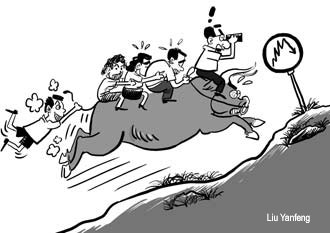Controlling capital market boom without hurting economy
 China's unprecedented stock market boom reflects the hopes and dreams of ordinary Chinese who are voting with their savings on the progress of China's market economy. The danger is over enthusiasm begot by an undersupply of stocks if the market economy does not evolve fast enough.
China's unprecedented stock market boom reflects the hopes and dreams of ordinary Chinese who are voting with their savings on the progress of China's market economy. The danger is over enthusiasm begot by an undersupply of stocks if the market economy does not evolve fast enough.
This is a chapter in the story of China's booming financial or capital economy versus a "real" economy that may actually be near recession and effective deflation. That deflation is reflected in domestic prices, including wages, that are not increasing fast enough compared with still untapped huge productivity potential in the real economy. Improving productivity prevents wage and price increases from being inflationary.
The State has relied on the monetary policy tools of the People's Bank of China. The central bank has increased interest rates and banks' reserve deposits to control the capital economy boom. But these measures depress the underlying real economy whose growth is fundamental to mitigating the capital economy boom. This is the subject of a forthcoming book by economist Xiang Songzuo being published by Peking University Press.















